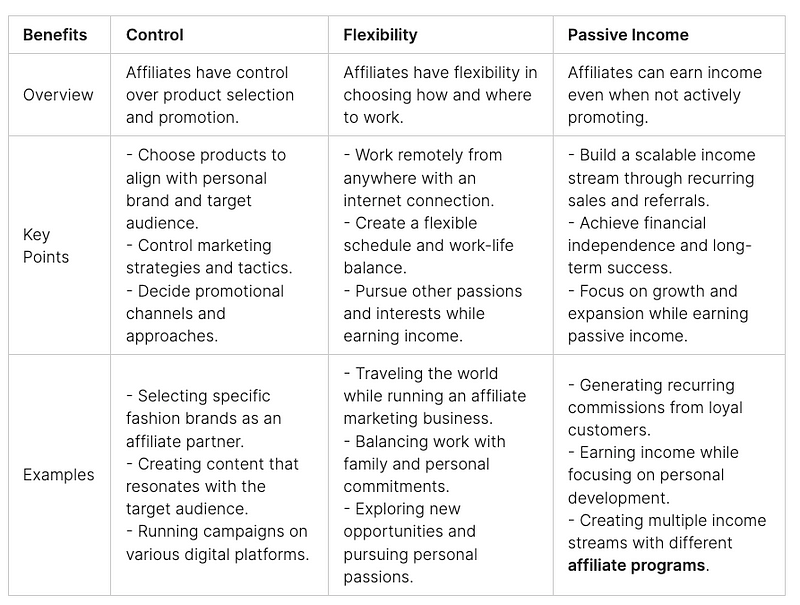When it comes to marketing approaches, two popular strategies that often come up in discussions are affiliate marketing and network marketing. While both methods aim to promote products or services and generate income, they differ in various ways. In this article, I will compare affiliate marketing and network marketing, highlighting their differences, benefits, and earning potential.

Key Takeaways:
- Affiliate marketing involves promoting other people’s products or services and earning a commission on sales.
- Network marketing, also known as multi-level marketing (MLM), involves selling products directly and earning income from personal sales and recruited distributors.
- Affiliate marketing offers more control and flexibility, while network marketing focuses on building a network and potential residual income.
- Affiliate marketing allows individuals to work from anywhere and potentially earn passive income.
- The choice between affiliate marketing and network marketing depends on individual goals, preferences, and the ability to build a network.
- Comparison of Two Leading All-in-One Platforms.
Understanding Network Marketing
Network marketing, also known as multi-level marketing (MLM), is a business model where a company sells products directly to consumers through a network of independent distributors.
Distributors in network marketing are not only compensated for their own sales but also for the sales made by the distributors they recruit. This compensation structure creates opportunities for individuals to build their own business and earn income.
Network marketing offers several benefits for those looking to start a business. Firstly, it provides the potential for income growth as distributors earn commissions not only from their personal sales but also from the sales made by their recruited distributors.
Furthermore, network marketing allows individuals to start a business with low upfront costs. Unlike traditional businesses that require significant investments, network marketing often only requires a small initial investment to get started. This makes it accessible to a wider range of individuals.
In addition to financial benefits, network marketing also offers the opportunity for personal growth and development. As distributors build their business, they develop valuable skills such as sales, communication, and leadership, which can be applied in various aspects of life.
However, network marketing is not without its pitfalls. One of the common criticisms is its focus on recruitment rather than product sales. Some network marketing companies prioritize recruiting new distributors over selling products, which can lead to an imbalance in the business model.
Additionally, finding customers outside of the network can be challenging for distributors. The success of network marketing often relies heavily on building a network and leveraging personal connections, which may limit the potential customer base.
There is also the potential for pyramid schemes in network marketing. Pyramid schemes are illegal and rely on recruiting new members to generate profits, rather than on selling a genuine product or service. It is crucial for individuals to carefully research and choose legitimate network marketing companies to avoid falling into pyramid schemes.
Network marketing, when done legally and ethically, can be a legitimate way to earn income and build a business.

Understanding Affiliate Marketing
Affiliate marketing is a powerful and effective marketing model that brings together entrepreneurs, businesses, and consumers. In this performance-based approach, affiliates play a key role in promoting products or services and earning a commission on each successful sale they generate. This mutually beneficial arrangement allows affiliates to monetize their marketing efforts while businesses reach a wider audience through the power of affiliate partnerships.
One of the greatest advantages of affiliate marketing is the level of control it offers to affiliates. Unlike other marketing models, affiliates have the freedom to choose which products and services they want to promote, based on their interests, expertise, or target audience. This control enables affiliates to align their promotions with their personal brand and create authentic connections with their audience.
The benefits of affiliate marketing extend beyond the realm of control and choice. Affiliates have the flexibility to work from anywhere, allowing them to create a lifestyle that suits their needs and aspirations. Whether it’s traveling the world, spending more time with family, or pursuing other passions, affiliate marketing provides the opportunity to earn income while enjoying the freedom and flexibility of a remote work environment.
Another significant benefit of affiliate marketing is the potential for passive income. By generating ongoing sales and referrals, affiliates can earn a commission on a recurring basis, even when they’re not actively promoting. This passive income stream allows affiliates to build a scalable and sustainable business over time, potentially leading to financial independence and long-term success.
Commissions are at the heart of affiliate marketing. As affiliates drive sales and referrals, they earn a predetermined percentage or fixed amount for each successful transaction. This commission structure directly ties an affiliate’s income to their marketing efforts, providing a clear incentive to generate results. It’s important to note that affiliate programs typically offer competitive commission rates to attract and motivate affiliates to promote their products or services.
Benefits of Affiliate Marketing
- Flexibility: Affiliates have the freedom to choose which products or services to promote and how to promote them.
- Remote Work: Affiliate marketing allows individuals to work from anywhere, providing the flexibility to create the desired lifestyle.
- Passive Income: By generating ongoing sales, affiliates can earn income even when they’re not actively promoting.
- Control: Affiliates have the control to align their promotions with their personal brand and target audience.
- Commission-Based Earnings: Affiliates earn a commission on each successful sale or referral they generate.
- Wide Range of Affiliate Programs: Many companies offer affiliate programs, providing ample opportunities to join and start promoting products or services.
Affiliate marketing presents a win-win situation for both affiliates and businesses. Affiliates can leverage their marketing skills and audience to generate income, while businesses can tap into a vast network of affiliates to expand their reach and boost sales. It’s a collaborative approach that fosters growth, innovation, and partnerships in the competitive digital landscape.
Overall, affiliate marketing offers numerous benefits, including control, flexibility, passive income potential, and the ability to create a profitable business. Whether you’re an aspiring entrepreneur or an established marketer, this marketing model can provide a rewarding and lucrative path to success.
“Affiliate marketing is a dynamic and empowering way to monetize your marketing efforts. With the freedom to choose, control, and earn commissions, it’s a win-win for both affiliates and businesses.”


Key Differences Between MLM and Affiliate Marketing
When comparing MLM (multi-level marketing) and affiliate marketing, it becomes apparent that these two sales approaches have distinct differences in their sales structure, income opportunities, recruitment methods, and commission systems. These variances are crucial to understanding which marketing strategy aligns with your goals and preferences.
Let’s Compare Two of the Best All-in-One Marketing Platforms on the Market Today: Builderall vs. Systeme.io
Builderall and Systeme.io are two of the leading all-in-one email marketing platforms that cater to entrepreneurs and businesses looking to streamline their online marketing efforts. Both platforms offer a suite of tools designed to enhance digital marketing strategies, but they each have unique features that make them stand out.
Builderall prides itself on its comprehensive toolset, which includes a website builder, email marketing automation, sales funnels, and much more. It’s designed for those who want to create, market, and manage online businesses in one place. With its user-friendly interface, Builderall makes it easy for beginners and professionals alike to develop their online presence. The platform’s strength lies in its versatility, allowing users to tailor their marketing strategies with a wide range of tools at their disposal.
Systeme.io, on the other hand, offers a streamlined approach to online business management. It focuses on simplicity and efficiency, providing key features such as email marketing, funnel creation, course hosting, and website building. Systeme.io is particularly favored by entrepreneurs and small businesses for its ease of use and affordability. It enables users to automate their marketing, sell products, and manage their business with minimal hassle. The platform’s integrated approach ensures that users can quickly set up and scale their operations without needing to juggle multiple tools.
Check Out Builderall Here
Check Out Systeme.io Here
Disclaimer: If you click on these links and make a purchase, I may receive a commission at no additional cost to you. These affiliate partnerships help support my work and allow me to continue bringing you valuable content.
Sales Structure
One key distinction between MLM and affiliate marketing lies in their sales structure. MLM operates on a hierarchical model where salespeople earn commissions not only on their own sales but also on the sales made by their recruited distributors. In contrast, affiliate marketing solely compensates affiliates for their individual sales and referrals.
Income Opportunities
MLM offers the potential for residual income by building a sales network. As distributors recruit more salespeople and expand their network, they can earn commissions based on the sales generated by their downline. Conversely, affiliate marketing focuses on individual sales performance, without requiring the creation or management of a network. Affiliates earn income solely through their personal sales and the referrals they generate.
Recruitment
Recruitment plays a significant role in MLM, as building a network is essential for expanding sales and earning potential. The emphasis on recruitment aims to create a robust salesforce and extend market reach. In contrast, affiliate marketing primarily focuses on promoting products or services, with minimal emphasis on recruitment.
Commission Systems
MLM typically involves upfront costs and ongoing fees, creating a financial barrier to entry for aspiring distributors. In affiliate marketing, joining programs is usually free, allowing individuals to start promoting products right away without a financial burden. Moreover, MLM often distributes commissions among multiple levels within the sales structure, while affiliate marketing compensates affiliates solely based on their own sales efforts and referrals.
Ultimately, the choice between MLM and affiliate marketing depends on individual preferences, goals, and aptitude for building a network. MLM offers the potential for residual income and a supportive company infrastructure, while affiliate marketing provides flexibility, control, and the potential for passive income. Consider these key differences and evaluate how they align with your entrepreneurial aspirations.


Conclusion
After a thorough comparison between affiliate marketing and network marketing, it is clear that both approaches have their own unique advantages and disadvantages. The choice between the two ultimately depends on individual goals, preferences, and the ability to build a network.
Affiliate marketing offers more control and flexibility as affiliates have the freedom to choose which products or services they want to promote and how they want to promote them. Additionally, affiliate marketing has the potential for passive income, where affiliates can continue to earn commissions even without actively promoting the products.
On the other hand, network marketing offers the potential for residual income through building a network and earning from the sales made by recruited distributors. This approach also provides training and support from the company, which can be beneficial for individuals who prefer a structured business model.
When deciding between affiliate marketing and network marketing, it is crucial to carefully consider the differences and weigh the pros and cons. Assess your own goals, preferences, and networking abilities to choose the approach that aligns best with your needs and aspirations.
Disclaimer: This post contains affiliate links. If you click on these links and make a purchase, I may receive a commission at no additional cost to you. These affiliate partnerships help support my work and allow me to continue bringing you valuable content. Thank you for your support!
FAQ
What is the difference between affiliate marketing and network marketing?
Affiliate marketing involves promoting other people’s products or services and earning a commission on sales, while network marketing, also known as multi-level marketing (MLM), involves selling products directly to consumers and earning income from personal sales and the sales of recruited distributors.
What are the benefits of network marketing?
Benefits of network marketing include the potential for income, the ability to start a business with low upfront costs, and the opportunity for personal growth and development.
What are the pitfalls of network marketing?
Pitfalls of network marketing include the focus on recruitment rather than product sales, difficulty in finding customers outside of the network, and the potential for pyramid schemes.
What is a pyramid scheme?
Pyramid schemes are illegal and rely on recruiting new members to generate profits rather than on selling a genuine product or service.
Is network marketing a legitimate business model?
Yes, network marketing, when done legally and ethically, can be a legitimate way to earn income.
What is affiliate marketing?
Affiliate marketing is a performance-based marketing model where affiliates promote products or services and earn a commission on sales.
What are the benefits of affiliate marketing?
Benefits of affiliate marketing include the ability to earn income without the need to create or own products, the freedom to work from anywhere, and the potential for passive income.
How do affiliates earn commissions?
Affiliates earn commissions based on their own sales and referrals they generate through their marketing efforts.
Do many companies offer affiliate programs?
Yes, many companies offer affiliate programs, which allow individuals to join and start promoting products or services for a commission.
What is the key difference between MLM and affiliate marketing?
One key difference is the sales structure. MLM involves a hierarchical structure where salespeople earn commissions not only on their own sales but also on the sales made by their recruited distributors. In affiliate marketing, affiliates earn commissions only on their own sales and referrals.
Which approach offers the potential for residual income?
MLM offers the potential for residual income through the sales of a network, while affiliate marketing focuses on individual sales and does not involve building a network.
Is MLM free to join?
MLM often requires upfront costs to join and ongoing fees, while affiliate marketing is typically free to join.
What is the difference in focus between MLM and affiliate marketing?
MLM relies heavily on recruitment, while affiliate marketing focuses on promoting products or services.
Is training and support provided in both MLM and affiliate marketing?
MLM offers training and support from the company, while affiliate marketing provides more freedom and control over the promotion strategies.
What should I consider when choosing between MLM and affiliate marketing?
Both approaches have their advantages and disadvantages. The choice depends on individual goals, preferences, and the ability to build a network.



